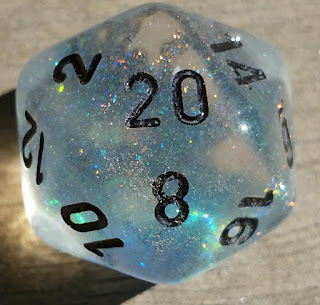This is a Chessex Aurora Boralis Confetti d20. The value of this is approximately $300 to $500 if not more, depending on the sale. Yes. That's for this single die. The last selling price of the set was over $2,000. Needless to say this is a very high end collector set and yes I have the whole set as well as the extra d20. No I did not pay that much for either of them. No I don't bring them to the table.
Now that we have that out of the way let's talk about GM styles and dice.
There's open roll, hidden roll, and what I call pretend roll.
- Open roll is where the GM rolls in the open and what the dice roll is what happens.
- Hidden roll is where the GM rolls where the players can't see but still uses the results more often than not
- Pretend roll is where the GM rolls and may or may not use the results.
Every GM has their own opinions and styles. None of these is more or less valid than the others. I won't get into that argument but I will give my opinions on them. Which is far different than making pronouncements. In my opinion.
Open Roll
I'd say this is more useful for modules when there isn't much in the way of ability to deviate from what's been laid out as the story. Honestly the only thing that can happen that isn't already considered is that the PCs can die. Otherwise they're going to do what the module says and end up where it says. So the dice are only there to find out if they make it or not.
In a less structured game this is a bit of a harsh way to play. It takes a lot of storytelling options away from the GM. By depending on the dice rolls the PCs may not be able to defeat the minions to get to the BBEG and die on the doorstep. They don't see the hidden door.
Some say this is the most honest way to roll dice. I don't disagree with that, if your intention is to have your game driven by random events.
Hidden Roll
To me this means rolling the dice and fudging here and there to make sure that the game progresses in a fun and semi-coherent fashion. The GM may roll a crit but just call it a regular hit to minimize damage. They can use opposed rolls in whatever fashion they like. Or they can use the rolls as-is to keep things more honest.
This combines the random aspect of dice with GM discretion as to when they should take precedence over the story and the table. By relying on them more often than not there is a randomness that makes the game chaotic like open rolling but not as deadly, unless the GM wants it that way.
Pretend Roll
The GM rolls dice, does whatever the heck they were going to do in the first place. The dice rolling is all for show (sound?) so that the players think there's randomness. The GM may even accept some of the dice rolls as part of the game.
This one has me conflicted. On one hand it means the dice don't run the game. On the other hand it means that there is no chance of something wonky but interesting happening. The GM is pure storyteller in this mode.
Summary
I had to make a break so this didn't seem like part of the roll type descriptions.
Personally I go with the Hidden Roll method. I don't let the dice decide my game but I want to give the players the same randomness they have to deal with on their side of the screen. I fully admit I fudge like crazy, especially damage rolls. My dice want to kill the PCs. I won't let them.
I can honestly react to the dice rolls as well which is a very underrated action. The GM is always on stage. The players are looking for non-verbal clues in how you react to what is happening behind the screen. So rolling dice and seeing what they want can give you ideas and even more important a few minutes to think about where the situation is going.
Yes. Dice rolls can also be used to gain precious thinking time.
As I said I don't leave my story up to the whims of shiny math rocks. I use them as tools to help me figure out what I want to happen in the near and mid term encounters. Maybe a dice roll can have long term implications. But I'm always the one who decides that.
As the GM it's ultimately your decision on how you want to use dice in your game. I will repeat that none of these is more valid than the others. It's very much a personal decision on what method to use, unless you're using a rule set that requires a certain method for the GM to roll. If not then figure out which one suits your style, your game, and your players. Then use it. There's no reason you can't use a different style in a different game. Or even change to a different style in the same game.
Do what works for you. The mantra of most of the advice you get when asking how to GM.


No comments:
Post a Comment